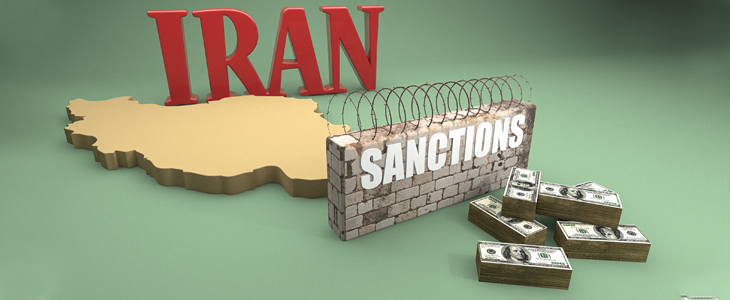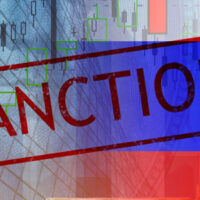
The urbanity of the regulatory world obscures the financial industry’s geopolitical side. Beneath the boardrooms, behind the conferences and between the lines of regulation lies the reality of the banking industry’s existence as an economic terrain. The recent drone attack and bombing of Saudi Arabia’s oil facilities at Abqaiq and Khurais, either conducted1 by Yemeni rebels or Iran, comprises a kinetic attack on the global economy’s supply chain and is the latest move in a geofinancial war between the United States (US) and Iran. Seeking to undermine Tehran’s theocratic government and to slow its nuclear program, the US recently upped the ante by financially targeting Iran’s pension sector. While conflict between Iran and its enemies in the Middle East often takes the form of proxy terrorist attacks on Israeli or Saudi targets or attempts to coerce or interfere with Saudi shipping in the Persian Gulf, American moves against Iran occur more often with the penning of economic sanctions. Since 2018, those sanctions have become more pointed and penetrating.
American economic statecraft aimed at Iran changed significantly from the Obama administration signing the Joint Comprehensive Plan of Action (JCPOA) in 2015—a “deal” designed to slow Tehran from obtaining nuclear weapons in exchange for sanctions relief—to the Trump administration’s full reinstatement of economic sanctions in 2018. In the past, American-led sanctions against Iran targeted the economy as a whole. Beginning shortly after the fall of the Shah in 1979, the financial industry has provided the widest forum for the exertion of American and international pressure against the Iranian regime. Sanctions at their core constitute an economic and financial weapon designed to obtain a political end; namely, they curtail a country’s ability to wage war while also undermining the legitimacy of the ruling regime through economic downturn. In the case of Iran, the government’s control of the economy has become top-heavy due to sanctions and such a consolidation of economic as well as political power makes the regime particularly vulnerable to attacking the country’s pensions.
As American-led sanctions against Iran have grown over the years, the economic role of the Islamic Revolutionary Guard Corps (IRGC) has expanded accordingly. Some analysts aptly argue2 that the illegal money laundering and terrorist financing carried out by the Iranian state grew in conjunction with IRGC’s ability to navigate the underground economy in the Middle East and the global financial sector. The political importance of the IRGC as an institution derives from its linking Tehran to terrorist groups beyond its borders, such as Hezbollah, Shia militias in Iraq and in its widespread domestic activity in the Iranian economy.3 In April, the Trump administration designated the IRGC as a terrorist organization.4 Far from hyperbole, this designation was not only the first instance5 in which the US branded an element of a foreign state as a terrorist organization, but this was also an escalation in the financial war for geopolitical influence in the Middle East.
Relationships underpin both business and prosperity, and currency allows the multitudinous relationships that power the international economy. Due to the pervasiveness of the US dollar in oil transactions and the currency’s international reserve status, the US enjoys a formidable capacity to sever Iran’s relationships with potential business partners. Once a useful economic weapon in the 1970s, oil production is not what it once was as a means of economic statecraft. Because the US now holds the top spot as the world’s largest6 oil producer, Iran’s ability to use oil as a weapon is curtailed. In addition, lower oil prices mean Iran has less ability to obtain foreign currency to revitalize its economy or to invest. Thanks to sanctions, what Iran does obtain in hard currency often requires laundering before it can be used.
Just earlier this year, Iran endeavoured7 to make legal reforms in order to move into greater compliance with best practices demanded by the Financial Action Task Force. Unsurprisingly, hardliners in Iran opposed the changes on the grounds that they would undermine Tehran’s ability to collaborate with terrorist groups across the Middle East.8 Those who supported the move did so believing that greater compliance would remove economic pressure on the country, particularly in the face of growing unrest9 over Iran’s rampant inflation. Low oil prices, increasing inflation and targeting the IRGC as Tehran’s main institutional means of connecting the Iranian state to the outside economy are all working to cripple the economy.10 Iran’s attack on Saudi oil facilities makes sense in such light, as a spike in oil prices would allow Tehran to obtain breathing room by exchanging oil for the hard currencies desperately needed for its economy.
To an outside observer, the centrality of the IRGC to the Iranian economy would seem to insulate the Iranian state from society; however, the country’s pension funds are almost entirely dependent11 on state backing. The efficacy of US sanctions is evident, particularly as all but one of Iran’s retirement funds12 currently faces deficits, including the pension fund for the Iranian military. The combination of popular discontent with the government, the impotence of Iran’s commodity weapon, the targeting of IRGC’s connections to the outside world as well as US pressure on Tehran’s military pension is nothing short of all-out economic warfare. Unlike the Obama administration’s tilt toward diplomacy under the JCPOA, the Trump administration is mustering multiple geofinancial weapons against Iran. Yet, in order for such measures to work in forestalling terrorism and the proliferation of nuclear weapons in the Middle East, Iran’s ability to launder money must be limited.
Iran has the remarkable ability to leverage the international financial system for laundering purposes. In April 2019, British bank Standard Chartered faced $1 billion13 (US dollars) in fines for actively helping Iran navigate around sanction controls. In 2015, French bank BNP Paribas faced over $8 billion14 (US dollars) in fines for assisting Iran and other states in laundering by “stripping” names and account information to avoid a setting of compliance issues. Several years before, HSBC was fined $1.92 billion15 (US dollars) for laundering funds for Iran in addition to assisting Mexican drug cartels in circumventing anti-money laundering laws. While sanctions can never be airtight, they are getting tighter in cutting off the Iranian government from the global economy as well as its own population.
As Iran’s sphere of influence has grown over the course of the 2000s, the likelihood of outright war has similarly increased. Shia militias in Iraq, Syria, and Yemen, and Tehran’s longtime proxy in Lebanon’s Hezbollah form an Iranian network that spans much of the heart of the Middle East. While Iran’s tensions with Israel and Saudi Arabia run deep and date to the 1979 revolution, Tehran’s pursuit of nuclear weapons and the growth of its terror ties threaten to unsettle the balance of power in a region still reeling from the Arab Spring and Syrian civil war. These developments exacerbate sectarian tensions not only in the Middle East, but also threaten energy supplies that fuel economies throughout the eastern hemisphere and around the globe.
A fully nuclear-armed Iran can both catalyse a nuclear arms race in the Middle East and trigger an outright nuclear exchange with its neighbours. Iran’s proxy terrorist group, Hezbollah, has a track record of multiple confrontations with Israel. With an arsenal ranging from 10016 to 30017 warheads, Israel has more than enough nuclear armaments to retaliate against an Iranian attack. Similarly, Saudi Arabia’s Crown Prince Mohammad bin Salman declared18 in 2018 that the kingdom would seek its own nuclear weapons if Iran reaches nuclear status. The impact of the loss of life and the permanent loss of the Middle East’s energy supply in the event of a nuclear conflict in the region does not require much contemplation as to the potential cost of war. If the attack on Saudi Arabia’s oil field provides any indication, it is that war is always a possibility. As the geopolitics unfold, it is also worth reminding the compliance industry that it not only has a responsibility to safeguard the financial system, but it has a role in the conduct of economic warfare. Buying requisite materials for a nuclear program, paying scientists and obtaining missile technology requires money and the ability to move it. In the case of the Middle East, forestalling outright war requires winning the financial one.
- “Saudi oil attacks: Drones and missiles launched from Iran – US,” BBC NEWS, 17 September 2019, https://www.bbc.com/news/world-middle-east-49733558
- Esfandyar Batmanghelidj, “Tougher U.S. Sanctions Will Enrich Iran’s Revolutionary Guards,” Foreign Policy, 4 October 2018, https://foreignpolicy.com/2018/10/04/irans-revolutionary-guard-corps-wont-suffer-from-stronger-u-s-sanctions-theyll-benefit-irgc-trump-sanctions/
- Frederic Wehrey et. al, “The Rise of the Pasdaran: Assessing the Domestic Roles of Iran’s Islamic Revolutionary Guards Corps,” National Defense Research Institute, Chapter 5, 55-76, https://www.rand.org/content/dam/rand/pubs/monographs/2008/RAND_MG821.pdf, (Accessed 17 September 2019).
- “Designation of the Islamic Revolutionary Guard Corps,” U.S. Department of State, 8 April 2019, https://www.state.gov/designation-of-the-islamic-revolutionary-guard-corps/
- “Statement from the President on the Designation of the Islamic Revolutionary Guard Corps as a Foreign Terrorist Organization,” The White House, 8 April 2019, https://www.whitehouse.gov/briefings-statements/statement-president-designation-islamic-revolutionary-guard-corps-foreign-terrorist-organization/
- Candace Dunn and Tim Hess, “The United States is now the largest global crude oil producer,” U.S. Energy Information Administration, 12 September 2018, https://www.eia.gov/todayinenergy/detail.php?id=37053
- Bozorgmehr Sharafedin, “Iran approves anti-money laundering bill to ease foreign trade,” Reuters, 5 January 2019, https://www.reuters.com/article/us-iran-economy-fatf/iran-approves-anti-money-laundering-bill-to-ease-foreign-trade-idUSKCN1OZ0BW
- Holly Dagres, “Impeaching the Foreign Minister Won’t Solve Iran’s Woes,” Atlantic Council, 29 November 2018, https://www.atlanticcouncil.org/blogs/iransource/impeaching-the-foreign-minister-won-t-solve-iran-s-woes/
- Bozorgmehr Sharafedin, “Iran approves anti-money laundering bill to ease foreign trade,” Reuters, 5 January 2019, https://www.reuters.com/article/us-iran-economy-fatf/iran-approves-anti-money-laundering-bill-to-ease-foreign-trade-idUSKCN1OZ0BW
- Ramin Mostaghim and Melissa Etehad, “Middle-class Iranians resort to buying rotting produce as U.S. sanctions take toll,” Los Angeles Times, 28 August 2019, https://www.latimes.com/world-nation/story/2019-08-27/iran-trump-sanctions-economy-food-medicine-shortage
- Benjamin Weinthal, “REPORT: U.S. SANCTIONS ON IRAN BRING ITS PENSION SYSTEM TO NEAR COLLAPSE,” The Jerusalem Post, 15 September 2019, https://www.jpost.com/Middle-East/Iran-News/Report-US-sanctions-on-Iran-bring-its-pension-system-to-near-collapse-601668
- Nick Kalman and Rich Edson, “Pension funds in Iran on brink of collapse amid US ‘maximum pressure’ campaign,” Fox News, 13 September 2019, https://www.foxnews.com/politics/pension-funds-in-iran-on-brink-of-collapse-amid-us-maximum-pressure-campaign
- Kevin Dugan, “UK bank hit with $1B in fines for helping Iran launder money,” New York Post, 9 April 2019, https://nypost.com/2019/04/09/uk-bank-hit-with-1b-in-fines-for-helping-iran-launder-money/
- “BNP Paribas sentenced in $8.9 billion accord over sanctions violations,” Reuters, 1 May 2015, https://www.reuters.com/article/us-bnp-paribas-settlement-sentencing/bnp-paribas-sentenced-in-8-9-billion-accord-over-sanctions-violations-idUSKBN0NM41K20150501
- “HSBC spared further US money laundering sanctions as it battles to clean up its act,” The Telegraph, 11 December 2017, https://www.telegraph.co.uk/business/2017/12/11/hsbc-spared-us-money-laundering-sanctions-battles-clean-act/
- Anna Ahronheim, “SIPRI: ISRAEL HAS CLOSE TO 100 NUCLEAR WARHEADS,” The Jerusalem Post, 17 June 2019, https://www.jpost.com/Israel-News/SIPRI-Israel-has-close-to-100-nuclear-warheads-592702
- Sebastien Roblin, “Israel Might Have as Many as 300 Nuclear Weapons. And Some Are in the ‘Ocean.’” The National Interest, 28 July 2018, https://nationalinterest.org/blog/buzz/israel-might-have-many-300-nuclear-weapons-and-some-are-ocean-27011
- Patrick Wintour, “Saudi crown prince warns it will build nuclear bomb if Tehran does the same,” The Guardian, 15 March 2018, https://www.theguardian.com/world/2018/mar/15/saudi-arabia-iran-nuclear-bomb-threat-mohammed-bin-salman










